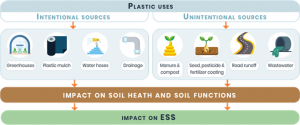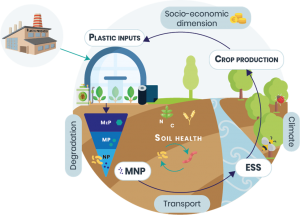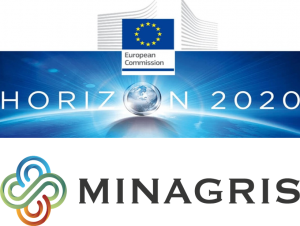Microplastics (MP, plastic particles smaller than 5 mm) and nanoplastics (NP, smaller than 103 nm) are now considered emerging pollutants of global importance for agricultural soils, ranging in concentrations from 55.5 up to 593 particles per kg soil. They are small enough to be ingested by a wide range of organisms and at nano-scale, they can cross biological barriers and enter plants systems. The reach soils via intentional release or unintentional sources where they could accumulate and adversely affect soil physicochemical properties and soil macrobiota. Still we know little about their effects on plant productivity and most importantly on the soil microbiota, the growth engine of terrestrial ecosystems.

Sources of MPs and NPs pollution of agricultural soils

The life-cycle of plastics in soil and their impact on the environment
Our group investigates, through a new EU funded project MINAGRIS the impact of MPs and NPs, either alone or interactively with other organic pollutants like pesticides and veterinary drugs that interact with plastics, on the soil microbiota, at both functional and diversity level. In addition we will determine via metataxonomic analysis the microbial composition of plastisphere, the surface of microplastics colonized by microorganisms, and its role in the evolution of novel catabolic traits (degradation of plastics or interacting organic pollutants) or as a carrier of human and plant pathogens using a range of omic tools including metagenomics and plasmidomic analysis. Cultivation approaches will be also utilized to isolated microbes from plastisphere degrading interacting pollutants like pesticides or veterinary drugs.
Collaborators: In this project we work closely with a range of academic and industrial partners including Wageningen University (Dr V. Geissen and Dr. S. Geisen), Universita Cattolica del Sacro Cuore (Dr Edoardo Puglisi) and INRAE-Dijon (Dr Fabrice Martin-Laurent)
Funding
 SFS-21-2020 – B, RIA-H2020, MIcro- and NAno-Plastics in AGRIcultural Soils: sources, environmental fate and impacts on ecosystem services and overall sustainability (MINAGRIS), Funding Body: European Commission, Duration 2021-2026, Funding: 450000 €. Scientific Coordinator: Dimitrios Karpouzas
SFS-21-2020 – B, RIA-H2020, MIcro- and NAno-Plastics in AGRIcultural Soils: sources, environmental fate and impacts on ecosystem services and overall sustainability (MINAGRIS), Funding Body: European Commission, Duration 2021-2026, Funding: 450000 €. Scientific Coordinator: Dimitrios Karpouzas
Personnel
Foskea Raevel, PhD student